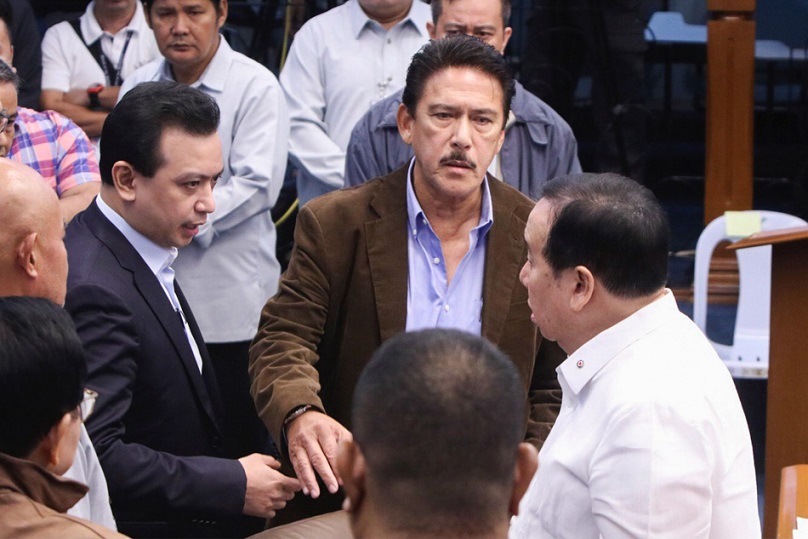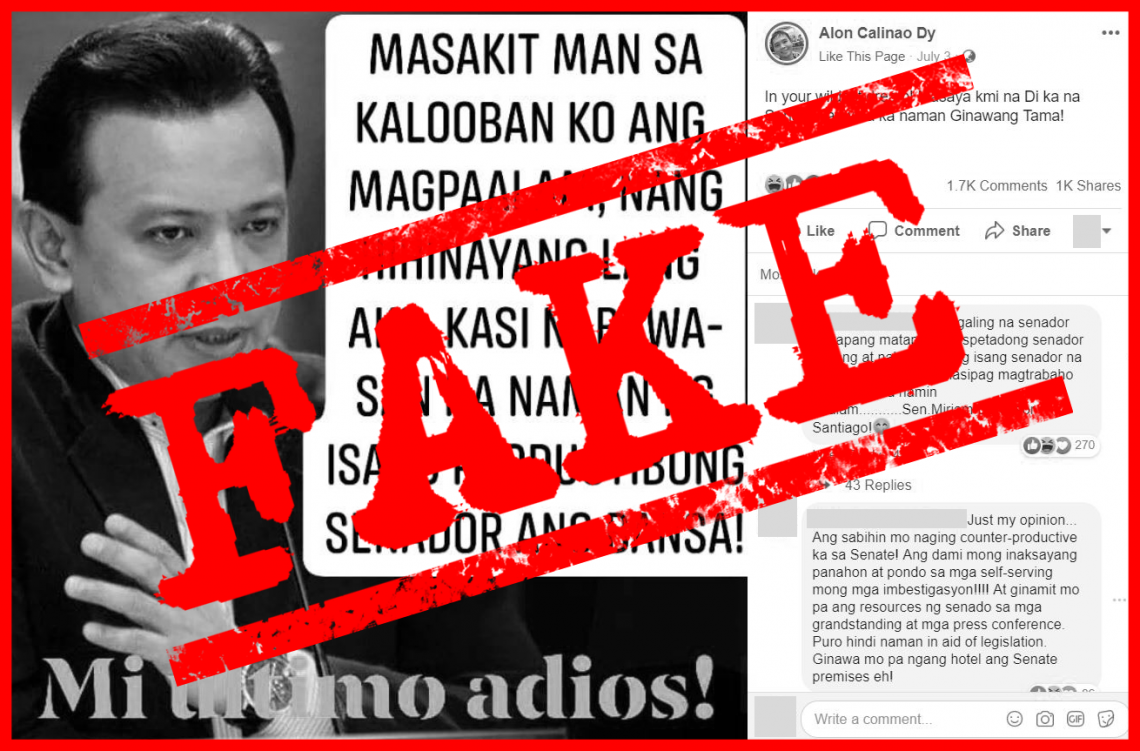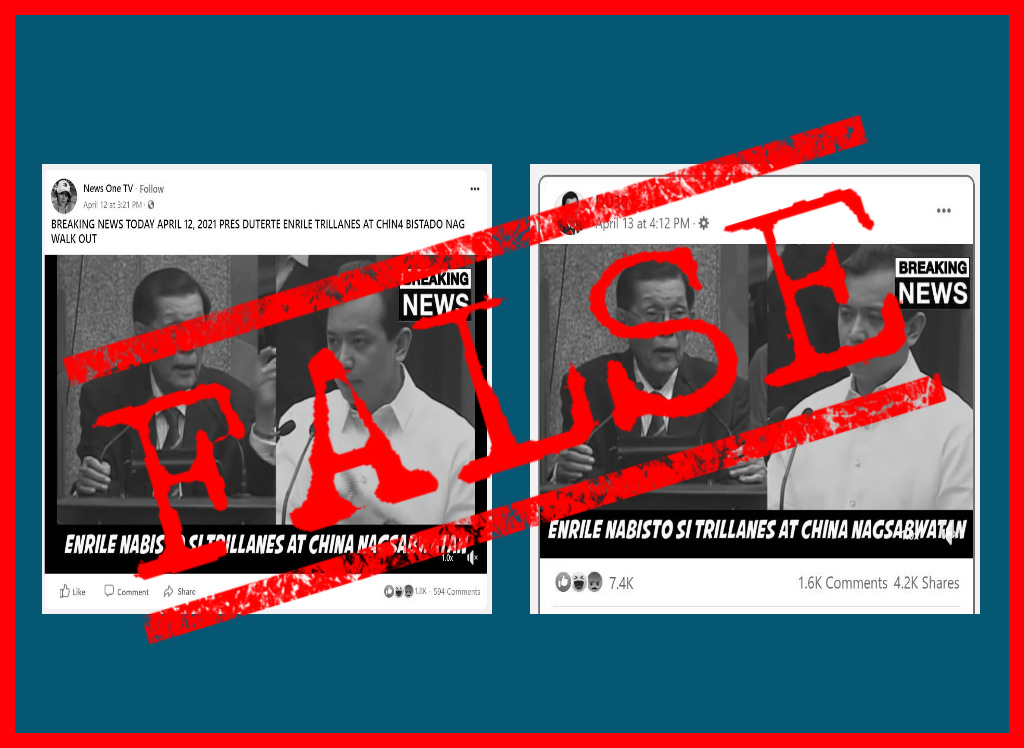Bellwether is “something that shows what the general future of changes or developments will probably be.”
Where does the word come from? Merriam-Webster says “We usually think of sheep more as followers than leaders, but in a flock one sheep must lead the way. … This animal was called the bellwether, a word formed by a combination of the Middle English words belle (meaning “bell”) and wether (refererring to a male sheep that has been castrated).”
This article shows why the Senate of the Philippines is a bellwether of the climate of public sentiment in the Philippines.

Sen. Richard Gordon, chairman of the Blue Ribbon Committee, and Sen. Antonio Trillanes IV in a heated argument whether to invite Presidential son Davao City Vice Mayor Paolo Duterte to probe on the smuggling of 604 kilos of shabu. Photo from ABS-CBN online.
Senators are among the most publicly exposed government officials. They are also the most sensitive, because they are elected nationally, seek reelection, or simply wish to leave a positive legacy when they are gone. Some aim to be President, using the Senate as a platform. They are therefore the most useful indicators of the climate of public opinion. This is where Senator Gordon and Senator Trillanes figure in. At the moment, they provide the people protagonists that will allow the people to make proxy choices for their values, attitudes, and opinion.
Are you for Gordon, or are you for Trillanes?
If you are for Gordon, then you are a Duterte fanatic. This is not the public defining Gordon. This is Gordon defining himself by his choices and his action. He has been an effective and colorful champion of Duterte’s will. One has to understand that this is a matter of political survival. Gordon has been in politics since 1968 when he ran as university councilor in UP Student elections. He was the youngest member of the 1971 Constitutional Convention. He was mayor like Duterte and served as senator. He had run for President, but lost in 2010. Gordon had wanted to be President of the Philippines from the time his father, then Mayor of Olongapo, was assassinated. Gordon is as resilient as politicians come.
Undoubtedly, this mastery of the art and skill of adversarial politics Gordon knew would be valuable to a mayor turned President like Duterte. He has offered his skills and experience in helping power Duterte’s political machine. He was quickly in the frontlines. He helped bludgeon Leila de Lima and get her behind bars. He deftly maneuvered around the Matobato and Lascañas political landmines, filtering thorns and allowing only roses in the testimonies and proceedings.
Gordon has depended too much on his perceived strong persona and forensic skills. He could have used his influence to help provide rhyme and reason to Duterte’s policies. Especially so since it appears he will no longer have the time, public support, or opportunity to be President after Duterte.
However, over the past year, it has become painfully clear to viewers of Senate hearings that he has run these as one-man shows — monopolizing the proceedings, editorializing to color the appreciation of the play, yet cutting down unceremoniously other senators who dared to contradict him. He would often switch to humor, but this only highlights the weirdness of the proceedings.
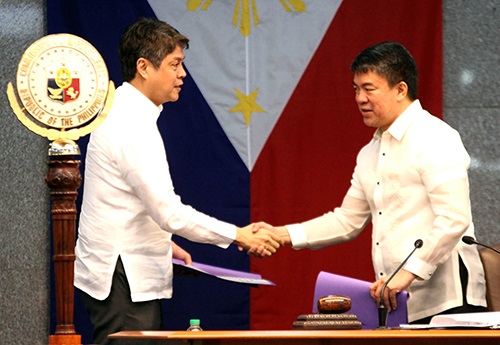
Senate President Aquilino Pimentel III, right, congratulates Minority Leadet Sen. Francis Pangilinan. Photo by Cesar Tomambo of Senate Media Office.
If you are for Trillanes, then you are a “dilawan” (yellow partisan). This is funny, considering that Trillanes does not even belong to the Liberal Party. But the Duterte fanatics have unwittingly given tangibility to the dilawan or yellow as all Filipinos opposed to Duterte and his war on drugs and his appeasement of China. Thus, they have conceptualized and given a name to a political force even before it has actually existed. Now the anti-Dutertes are taking a second look, and declaring themselves dilawan comfortably in public. Trillanes, apparently, is now the champion of the dilawans, whether or not he considers himself so.
The beauty of the Senate is that it is a collective body with relatively autonomous members. One can observe it as a collective unit, or as an aggregation of individual units. As such, the Senate is the bellwether of Philippine society. It does not always do so efficiently, but given enough time, it reflects the sentiment of the whole Filipino people.
The Senate as bellwether is also true of its outliers.
One cannot act like a country bumpkin and enjoy sustained power and prestige in a collective body like the Senate. Pacquiao’s sense of self-importance and self-entitlement in the Senate is an illicit reflection of his reputation as “pambansang kamao” which, for a time, did mesmerize the Filipino public.
Pacquiao’s public support has been dwindling as he suffered a series of defeats, most spectacularly against Marquez and Mayweather. Recently, the tipping point has been reached. the people do not take kindly to losers the way Pacquiao has lost to Horn. Clearly, it is understood he was not cheated; he did not do his homework and really prepare for the fight. It is doubtful that Pacquiao will be up to a rematch with Horn. People understand when they are let down. And this turn in sentiment is reflected back into the public view of Pacquiao’s performance in the Senate. The more he intervenes, the more he will make a clown of himself.
Vicente Sotto has a more stable source of reflected light — his continuous hosting of a popular television show. This, however, beams to the poorest of the poor, and does not have any currency with the AB and C. When he makes seemingly innocuous statements like “naano lang” referring to unwed mothers, the public pounces on him. Which is why Sotto has been wisely non-interventionist in important issues in Senate proceedings — less talk, less mistake.
In the Senate hearing featuring Polong Duterte, Gordon has painfully demonstrated his need for affirmation twice when he playfully said he loved Sotto each time he ruled as chair on his motions. The banter between the two seemed as if they felt they had been orphaned by the world.
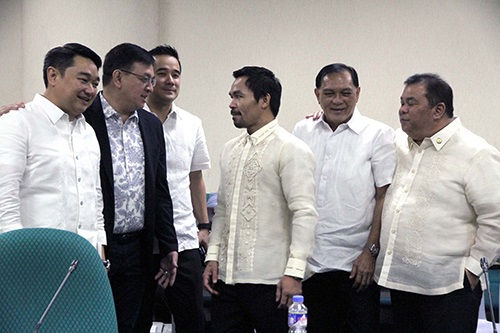
Sen. Manny Pacquiao, chairman of the Committee on Public Works, in a meeting with members of the House of Representatives.Photo by Cesar Tomambo of Senate Media Office.
And there is nothing that indicates the changing climate of public opinion more than the clash between Senators Richard Gordon and Antonio Trillanes. In the Senate hearing yesterday, Gordon tried to convey command of the chamber proceedings, which Trillanes wisely acceded to, being respectful of the chair all the way. But in the larger stage of public opinion, with the whole nation watching, it was Trillanes making a stellar performance. As a proxy for his father in the public’s eye, Paolo Duterte (and Mans Carpio), was putty in the hands of Trillanes. Trillanes was able to enter as evidence in the bar of public opinion the unwillingness of Paolo Duterte to show his tattoo, which Trillanes told the public, would determine if Paolo was a member of the Chinese Triad or not. What kind of non-evidence was that? Never mind — it has captured the imagination of the people. People are now agog to see the tattoo the way they expect the next full solar eclipse.
The problem with Duterte and supporters is that they do not have an exact estimate of how large is their political capital. They are victims of their own propaganda, citing the 16 million votes as a permanent infrastructure rather than a snapshot of a confluence of support at one time. Apart from this already being normally a difficult quantity to figure, they have been tampering with the books — contaminating the climate of public opinion through their social media storm troopers. One cannot be a public opinion thermometer and thermostat at the same time.
Nazi Germany eventually lost the war with Russia in World War II because it tried to gobble up too much territory, extending its supply lines and spreading its forces too thin. The same thing is happening with Duterte. He has succeeded in bending and making the Senate and the House of Representatives instruments of his will. He is trying to relegate the vice-president into irrelevance, he is trying to wear down the Ombudsman and the Commission on Human Rights. He is trying to neutralize the Supreme Court. He is also allowing his allies to create turbulence in the Commission on Elections.
He has gone far afield, unaware of his limits. He has attacked the principle of decentralization, a major pillar of post-Marcos Philippine governance. He is bent on politectonic change without the intellectual and philosophical muscle to effect constitutional change — doing away with barangay elections and getting the power to appoint all barangay captains.
In starting a war on all fronts, Duterte is overextending himself, calling on political capital that might not exist. A whiff of loss of power may be the signal for all anti-Duterte forces to galvanize into a force that can erode Duterte’s power quickly. It will create a dangerous power vacuum, as the military has not always been a disinterested observer when the wolf pack takes the lion down.
Duterte has also squandered political capital. In limiting his circle of political appointments to his limited circle of family, classmates, relatives, and friends, he has alienated those patriotic Filipinos who would have wanted to serve in a professional capacity in government. What little tentative support he had from the professional bureaucracy he lost with the way he appointed, used and discarded Mike Sueno, Gina Lopez, Judy Taguiwalo, and Rafael Mariano.
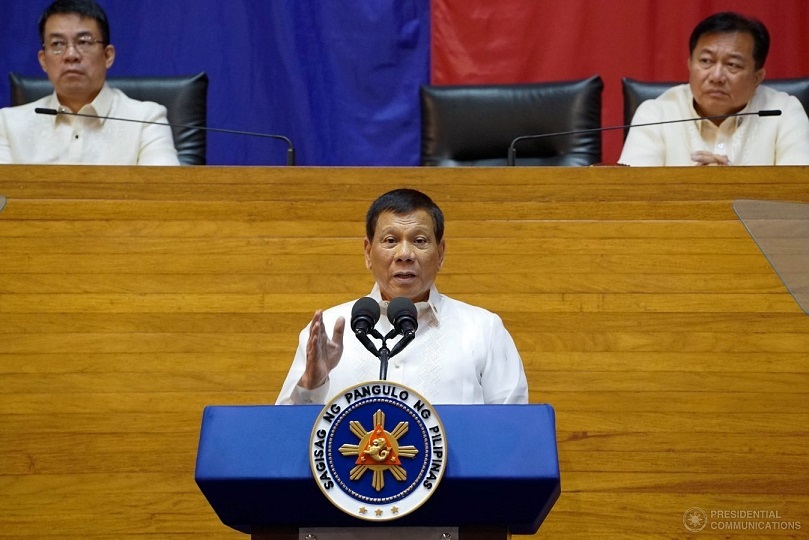
Pres. Duterte delivering his second State-of-the-Nation address. Malacañang photo by Rene Lumauag.
After Duterte was elected President I can still clearly see in my mind then Senator Pia Cayetano proudly outlining on television how the Duterte administration would systematically receive and screen nominations for government positions. She was taken aback and slid into silence when the appointments, one after another, came in the most informal of circumstances. Gina Lopez was offered the post of Secretary of the Environment the first time Duterte met her. Jose David Lapuz, one of Duterte’s erstwhile professors, was “appointed” even before a position was available.
The political balance sheet has unnecessarily deteriorated because President Duterte derives pleasure in broadcasting threats and boasts. His challenge to the Mautes to go attack Marawi may or may not be a proximate cause, but the Mautes did so, causing the nation to stumble into Marawi, an under-diagnosed hemorrhage that will drain national resources, socio-cultural goodwill, and political capital for years to come.
The fall of Duterte will come like the burst of a bubble, or a kite falling out of the sky for lack of wind. Duterte is all offense with no credible defense. He has depended too much on the institution — “the gang that cannot shoot straight” — the Philippine National Police. There is over-dependence on illusion over intelligence, innuendo over policy, and sycophants over career professionals. Because he has removed his pain sensors, he will not see it coming.
As for the public, they may have a sense of how the play is proceeding towards the brink by watching the Senators and the Senate. With so many storms coming our way in the form of impeachment complaints and public hearings on crime and corruption scandals, the Senate will have enough grist to grind. It is the bellwether institution, the public opinion scoreboard. Even under Duterte, the people remain the thermostat, determining the climate of public opinion.
(The author, Dr. Segundo Joaquin E. Romero, Jr. Professorial Lecturer at the Development Studies Program of the Ateneo de Manila University)
